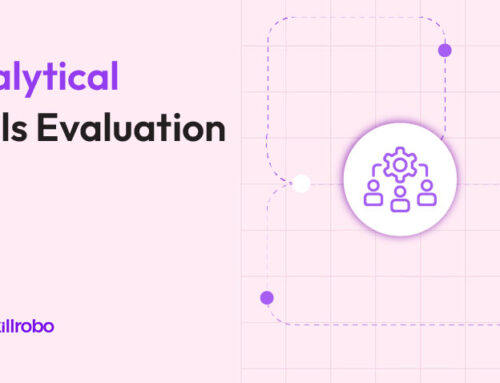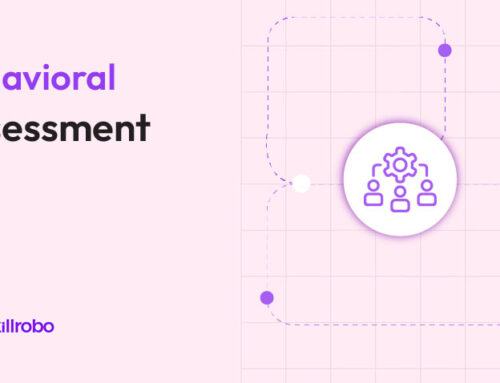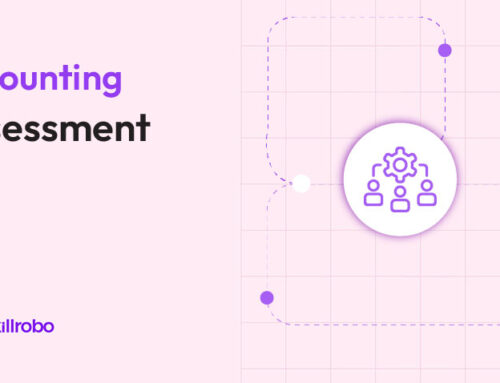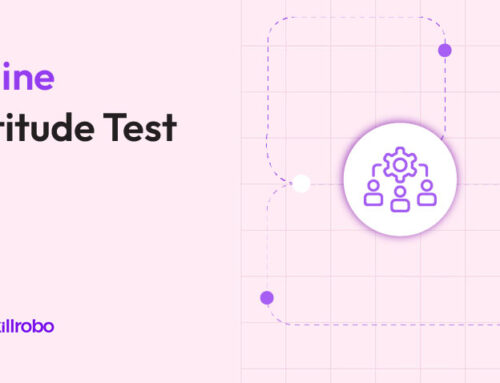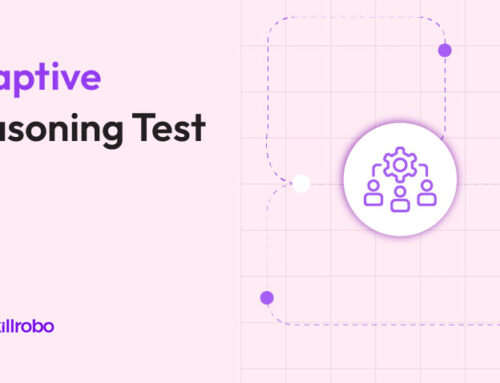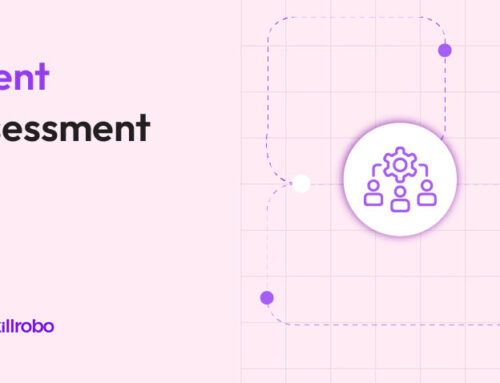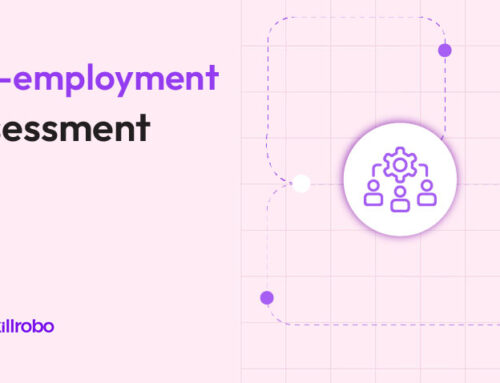Table of Contents
Related articles
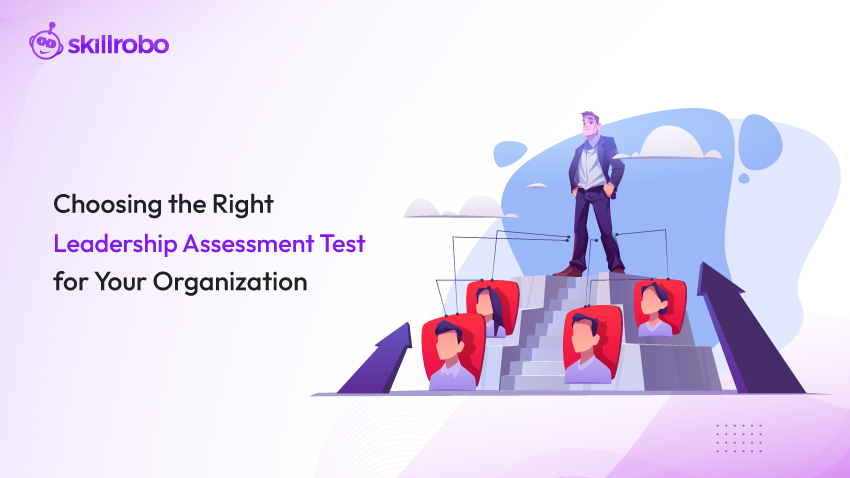
Key Takeaways
- According to a recent survey, 55% of the CEOs consider developing the next generation of leaders as the top challenge.
- Leadership assessment is all about understanding and developing a person’s leadership capability across a number of areas.
- Leadership assessment tests can be used to assess internal as well as external talent.
- Leadership training programs can be designed based on the findings of internal leadership talent assessments.
- As per a recent study, participants that are undergoing leadership training improved their learning capacity by 25% and their performance by 20%.
- A plethora of leadership assessment tests are available online, choosing the right one for your organization holds the key to comprehensive assessment.
What are Leadership Assessment Tests?
A leadership assessment test helps identify an individual’s leadership capacities in various domains and outlines their unique capabilities. A leadership style assessment test helps to figure out if the individual is a good fit for the role in an organization, based on the requirements of that role. Why do you need leadership assessment tests? What are the types of leadership assessments available? What are the best assessments for testing leadership skills? Get answers to all these questions in this blog.
Leadership is often underrated, but leadership skills are the pillars of the organization. Just like other skills, leadership skills also need to be assessed regularly to see if they can match up to certain standards that are prevalent in the market. Although leadership skill assessments are alienated in most organizations, regular assessments can improve the quality of leadership and steer overall organizational growth in the right direction.
Leadership assessments are especially useful for those aspiring to get into a leadership role, but are clueless as to the skills required for that role. Taking up a leadership assessment test helps individuals hone their managerial strengths, improve self-awareness, and increase your self-confidence. Hiring managers can use leadership assessments to determine potential leadership styles and attributes of candidates applying to leadership positions.
Leadership assessments are tools that are used to evaluate management skills. A leadership assessment can also be taken up by supervisors and managers to evaluate their own management traits and strengths. A leadership exam identifies an individual’s competencies, traits, drivers, and experiences that will allow them to excel in a leadership role. A leadership personality assessment reveals their potential for success as well as potential traits that might derail them for success. Leadership personality assessment provides answers to a variety of questions, including –
- Performance – How effective is the current leadership?
- Hiring and promotion – Do you have an internal leader who could step up and tackle today’s challenges?
What talent gaps do you have that you need to choose?
Do you need to hire external candidates or create a training plan to close these gaps?
- Potential – Which external candidates are ready to step into a more challenging role?
What capacity do they have for growth?
How fast can they mature in a new role?
- Fit – Do your people have the right skill set, mindset, and personality to excel in a key position?
Most leadership assessments can be categorized into 2 main types – personality tests and situational judgment tests. There are many tests that can be used as leadership assessment tools; each test having a different way of examining the diverse aspects of leadership competencies and potential. Skillrobo is an AI-powered pre-employment assessment software that comes with 100s of pre-designed employment assessments and can also be used to create custom tests as per the role. Skillrobo’s leadership assessment tests evaluate leadership competencies by solving scenario based questions within a stipulated time frame. These questions are designed to objectively and fairly evaluate the candidate’s suitability for the role, based on various factors like personality, culture, cognitive capabilities, situational judgment, and motivational skills. The multiple choice questions in Skillrobo cover a wide variety of skills for various roles in the organization.
Components of Leadership Assessment Tests
The goal of leadership assessments is to fairly evaluate the candidate’s suitability for the role. Skill assessments provide accurate, unbiased data on candidates capabilities, and simplify the hiring process. Leadership style assessment tests reveal the leadership style of the candidate. Key information on leadership styles, such as whether the candidate empowers the team or whether the candidate is strong willed or a task-oriented authoritarian who makes decisions fast. Each evaluation in the leadership assessment test reveals unique aspects of the candidate’s personality.
Critical thinking test – This test evaluates the decision making capacity of the candidate. Whether the candidate can make logical conclusions and has strong reasoning skills, can be concluded from the results of the critical thinking test.
Communication tests – Leading a team requires great communication skills. Communication tests are an integral part of leadership skill assessments. These tests evaluate listening, speaking, and information interpretation skills of the candidate.
Culture Add test – It is very important that the leader fits well into the culture of the organization. The culture add test reveals the candidate’s core values and beliefs. This information enables hiring teams to choose a leader who would have a positive influence on the team and bring fresh perspectives that are aligned to the organization’s culture.
Role-specific leadership skills tests – These tests identify people who understand key concepts about their industry and have mastered the art of implementing best practices for improving business results. Role-specific assessments also evaluate whether the candidate has the ability to lead a team of qualified professionals efficiently.
Importance of Leadership Assessment Tests
Why are leadership assessment tests important? A 2023 EY Consulting survey revealed that 79% of respondents consider empathetic leadership as one of the reasons they stay in a company. Also 88% of respondents felt that empathetic leadership creates loyalty among employees towards leaders. These statistics reiterate the importance of having capable individuals in leadership positions.
Hiring leaders for any organization requires a thorough evaluation of all their skills and capabilities. Good leaders are rare, and companies over-reliance on resumes often misleads them because they are not sufficient proof of skills and capabilities. Leadership assessments are important for a variety of reasons, including –
- Prediction of job performance more reliably than any other evaluation method
- Limiting the bias to ensure that candidates are chosen objectively
- Saving significant recruitment resources and overheads of mis-hiring
- Providing a fair chance for all candidates to show their capabilities
- Helping the team hire the best leader based on the situation and requirements of the role
- Reducing the time to hire
- Improving the quality of the hire and facilitating a replicable hiring process
Leadership assessments can identify the management skills of candidates and provide a deeper understanding of personal strengths that may further hone and develop leadership abilities. Other ways in which leadership assessments benefit the organization are –
Helps locate and focus on management’s weakness – Some leadership assessments are capable of determining the management skills needed for further development. These tests give managers or candidates being considered for leadership roles to target and improve upon their current managerial challenges.
Helps improve self-awareness – Quality managers understand their leadership traits and abilities. Leadership assessments can help increase your awareness of personal strengths to capitalize on and the challenges they need to overcome.
Enhances the leadership potential within the organization – Some businesses create leadership development plans, or outline the future direction of and goals for the leadership at their company. These assessments can also help companies achieve their leadership goals and design development plans by hiring, training, and evaluating new or existing managers.
Guide and develop career advancement plans – Leadership assessment tests can help supervisors and managers create their future career plans. For instance, a leadership assessment may help you decide to enroll in a specific type of management training program.
Identifying Leadership Material
So, what are the personality traits of a leader? High potential leaders can be assessed based on the following traits –
Learning ability or the openness to learn – Leaders must be willing to learn and adapt to newer technologies or innovations that emerge in their line of business. They must exhibit an ability to learn from experience and apply that learning to perform successfully under new or first-time conditions.
A proven track record of formative experiences – Leaders must have a track record of formative experiences that prepare them for future leadership roles involving development of operational strategies.
16 Types of Leadership Assessment Tests
How do you choose the best leadership test for your organization? We have put together a list of 16 types of leadership assessment tests used by hiring managers and teams to recruit skilled and capable leaders for their organizations.
Dominance -Influence-Steadiness-Conscientiousness (DISC)
These assessments are among the most popular leadership assessments used by hiring teams. This leadership assessment test comprises questions focused on a person’s observable behaviors and evaluates the way candidates approach challenging situations at work. This assessment also evaluates the communication skills of candidates. The candidates are ranked in 4 categories.
Dominance – This category assesses how task-oriented the candidate is.
Influence – This category measures how much focus the individual places on guiding, supervising, or influencing others.
Steadiness – This category evaluates how cooperative the candidate is and how dependable you are.
Conscientiousness – This category analyzes the amount of attention you give to the accuracy and quality of a task’s end results.
USC’s Interactive Leadership Style Assessment
The University of Southern California’s assessment analyzes specific leadership styles. Knowing your leadership style can help you have a better understanding of how your team members view you. The interactive leadership style assessment evaluation includes postmodern, frontline, and transformational. When the understanding of your leadership style aligns with what your leadership style truly is, you are more likely to form cooperative relationships with team members.
Big 5 Ocean test
The Big 5 (Ocean) test is a leadership personality assessment that evaluates the individual’s character traits, decision making, mindset, strengths, and how they relate to others. It uses the five-factor model theory that classifies personalities based on 5 different characteristic spectrums – Openness, Conscientiousness, Extroversion, Agreeableness, and Neuroticism. The candidates that take up this test go on a self-assessment journey where they score various statements from 1 to 5. This test does not necessarily predict job performance, but it helps understand the candidate’s leadership style and personality.
Myers-Briggs Type Indicator
The Myers-Briggs Type Indicator (MBTI) is a popular personality test that is commonly used for employment or leadership purposes. The MBTI evaluates candidates based on 4 factors –
- Interaction with others – This test ranks how introverted or extroverted a person is. People who are introverts tend to lean towards spending time alone, while extroverts are more likely to gain energy from social interactions.
- Processing and interpreting information – This test evaluates whether you prefer to sense or intuit information. Sensing means that information is gathered from physical senses like touch and sight. Intuition refers to the impressions you interpret based on the given information.
- Decision making – Some people make decisions on one choice over others primarily considering objective facts or situations. Others make decisions by considering the individual emotions, people, or personal concerns.
- Managing external situations – The final factor evaluates the way others perceive your actions. Individuals that are perceived as structured usually fit into the psychological category of Judging.
Energy Leadership Index
The energy leadership index (ELI) is an attitudinal assessment that analyzes how your perceptions of the world affects your behavior, thoughts, and opinions. The ELI can help managers and supervisors understand and improve upon their self-awareness and their emotional intelligence. For example, the ELI measures how much anabolic energy a person has, which is nothing but a person’s ability to contribute to positive results, for motivating other people and inspiring creativity.
Leadership blind spot assessment
This leadership assessment test was designed by the Princeton Management Consulting Group (Princeton MCG) offers a leadership assessment that evaluates the individual’s ability to take blind spots. In psychology, blind spots refer to a person’s lack of awareness about some of their own skills or characteristics. The Leadership Blind Spot Assessment helps managers and supervisors identify their blind spots and focus on developing these abilities or traits. This assessment can be used to identify blind spots within the team, especially when they sell products or services.
Survey sparrow assessment
This is a comprehensive assessment that lets you collect feedback from employees on how their leader works and mentors them. The 360 degree feedback gathered from this tool helps analyze the strengths, weaknesses, and overall personality of the manager. The Survey Sparrow’s 360-degree feedback tool offers an intuitive UI that offers both conversational-style and chat-like surveys. Once the responses from the team start coming in, you can easily spot the trends and patterns from the dashboard.
Communication test
Good communication is an essential trait of leaders. Often oral communication is assumed to be the only communication trait that an individual should have. But, good listening and data interpretation skills are also important aspects of an individual’s communication capabilities. A good leader must be adept at all forms of communication. The leadership assessment test must include communication tests that evaluate spoken, written, and interpretation skills of leaders.
Gallup Strengths finder or Clifton Skills finder
This test gives you detailed information on the person’s strengths. This skill assessment is widely used to identify the areas where the person performs best and also suggests areas to improve to be the best. The tool motivates individuals to work on their strengths, rather than developing their weaknesses. It figures out top 5 traits/strengths from the lot and gives constructive feedback for improving these strengths. The Clifton Strength Assessment is ideal for personal coaching as it helps in identifying areas they are best at, but the tool fails to prove worth when the team context is considered.
Hogan Assessments
These assessments predict a managerial candidate’s future performance and leadership style. Hogan assessments ask test-takers to evaluate their leadership strengths, behavioral tendencies, and preferred work environment. These assessments are used by managers to shortlist applications for management positions and further the company’s leadership development plan or goals.
TINYpulse
Some leadership assessments need not be taken by leaders, but by team members or colleagues. The company’s leaders supervise team members or colleagues complete leadership assessments. Anonymous employee engagement tools like TINYpulse, can help current company managers and supervisors understand how others in the workplace view their leadership style, abilities, and strengths.
Optimal Thinking Leadership Assessment
This leadership assessment from Optimal Thinking helps directors and supervisors understand how to improve on their leadership weaknesses and sharpen their leadership strengths. This is a free online assessment that asks 25 different questions about their interactions with others, their values and behaviors. The results from this test provide personalized suggestions for career paths that may capitalize on existing leadership strengths. The assessment results may be particularly useful for professionals looking to develop or advance their careers.
Emergenetics
Emergenetics offers assessments based on neuroscience principles, meaning the science of how the brain works. These assessments ask company leaders about their behaviors and their mental processes or preferences. Managers and supervisors can use the insights from these assessments to increase their self-awareness, improve cooperation between team members, and grow their careers.
Leadership Temperament Index (LTI)
The Leadership Temperament Index from ExecuSmart is a leadership skill assessment that focuses on 12 cognitive preferences that are predictors of one’s leadership styles. These questions are divided into 4 categories – Coach, Director, Strategist, and Counselor.
Leadership Alliance Assessment
The Leadership Alliance Assessment is a test that focuses on healthcare executives and senior-level roles. The test measures ten management competencies, such as leadership style, critical thinking, and problem solving.
M2D Leadership Test
The M2D Leadership test is a psychometric assessment of your strengths and the areas that require improvement. The test measures 4 group competencies – Personal, project management, strategic competencies, and people management.
Skillrobo and Leadership Assessment
Skillrobo is an AI-powered pre-employment assessment tool that can be used to create your own test or choose from our ready-to-use skill tests for recruiting talented employees. 100s of pre-designed employment assessment tests in Skillrobo can be used to evaluate a variety of skills. The platform makes it easy for recruiters to find right candidates for the roles by leveraging the robust skill and test libraries available in the software. You can create tests, invite candidates, and get instant reports from Skillrobo. Top features in Skillrobo include –
Engaging and interactive – All questions in Skillrobo are interactive and engaging, providing the full scope to candidates to prove their abilities and skills.
ARIV – ARIV is an AI-based question generator using which questions can be generated from across the internet for various roles.
Enterprise Integration – This platform facilitates integration with external applications like HR evaluation system for evaluating candidate performance.
Live Proctoring – This tool offers provision to proctor a live exam. Skillrobo also lets the invigilator view the test screen of all candidates taking up the test.
Analytics and reports – Skillrobo offers an in-depth analysis and evaluation of every candidate.
Conclusion
“Before you are a leader, success is all about growing yourself. When you become a leader, success is all about growing others.” -Jack Welch
Good leadership is what steers the organization towards success. The onus of hiring good leaders lies with the hiring manager. Going through each profile manually is a tiresome process and may not yield the expected results within the expected timeframe. Leadership assessment tests are an effective way to sift through hundreds of profiles to find the right fit. A leadership assessment test like the one in Skillrobo is the best leadership test for hiring skilled and capable managers. To explore Skillrobo further, sign up for the free trial today.

Key Takeaways
- According to a recent survey, 55% of the CEOs consider developing the next generation of leaders as the top challenge.
- Leadership assessment is all about understanding and developing a person’s leadership capability across a number of areas.
- Leadership assessment tests can be used to assess internal as well as external talent.
- Leadership training programs can be designed based on the findings of internal leadership talent assessments.
- As per a recent study, participants that are undergoing leadership training improved their learning capacity by 25% and their performance by 20%.
- A plethora of leadership assessment tests are available online, choosing the right one for your organization holds the key to comprehensive assessment.
What are Leadership Assessment Tests?
A leadership assessment test helps identify an individual’s leadership capacities in various domains and outlines their unique capabilities. A leadership style assessment test helps to figure out if the individual is a good fit for the role in an organization, based on the requirements of that role. Why do you need leadership assessment tests? What are the types of leadership assessments available? What are the best assessments for testing leadership skills? Get answers to all these questions in this blog.
Leadership is often underrated, but leadership skills are the pillars of the organization. Just like other skills, leadership skills also need to be assessed regularly to see if they can match up to certain standards that are prevalent in the market. Although leadership skill assessments are alienated in most organizations, regular assessments can improve the quality of leadership and steer overall organizational growth in the right direction.
Leadership assessments are especially useful for those aspiring to get into a leadership role, but are clueless as to the skills required for that role. Taking up a leadership assessment test helps individuals hone their managerial strengths, improve self-awareness, and increase your self-confidence. Hiring managers can use leadership assessments to determine potential leadership styles and attributes of candidates applying to leadership positions.
Leadership assessments are tools that are used to evaluate management skills. A leadership assessment can also be taken up by supervisors and managers to evaluate their own management traits and strengths. A leadership exam identifies an individual’s competencies, traits, drivers, and experiences that will allow them to excel in a leadership role. A leadership personality assessment reveals their potential for success as well as potential traits that might derail them for success. Leadership personality assessment provides answers to a variety of questions, including –
- Performance – How effective is the current leadership?
- Hiring and promotion – Do you have an internal leader who could step up and tackle today’s challenges?
What talent gaps do you have that you need to choose?
Do you need to hire external candidates or create a training plan to close these gaps?
- Potential – Which external candidates are ready to step into a more challenging role?
What capacity do they have for growth?
How fast can they mature in a new role?
- Fit – Do your people have the right skill set, mindset, and personality to excel in a key position?
Most leadership assessments can be categorized into 2 main types – personality tests and situational judgment tests. There are many tests that can be used as leadership assessment tools; each test having a different way of examining the diverse aspects of leadership competencies and potential. Skillrobo is an AI-powered pre-employment assessment software that comes with 100s of pre-designed employment assessments and can also be used to create custom tests as per the role. Skillrobo’s leadership assessment tests evaluate leadership competencies by solving scenario based questions within a stipulated time frame. These questions are designed to objectively and fairly evaluate the candidate’s suitability for the role, based on various factors like personality, culture, cognitive capabilities, situational judgment, and motivational skills. The multiple choice questions in Skillrobo cover a wide variety of skills for various roles in the organization.
Components of Leadership Assessment Tests
The goal of leadership assessments is to fairly evaluate the candidate’s suitability for the role. Skill assessments provide accurate, unbiased data on candidates capabilities, and simplify the hiring process. Leadership style assessment tests reveal the leadership style of the candidate. Key information on leadership styles, such as whether the candidate empowers the team or whether the candidate is strong willed or a task-oriented authoritarian who makes decisions fast. Each evaluation in the leadership assessment test reveals unique aspects of the candidate’s personality.
Critical thinking test – This test evaluates the decision making capacity of the candidate. Whether the candidate can make logical conclusions and has strong reasoning skills, can be concluded from the results of the critical thinking test.
Communication tests – Leading a team requires great communication skills. Communication tests are an integral part of leadership skill assessments. These tests evaluate listening, speaking, and information interpretation skills of the candidate.
Culture Add test – It is very important that the leader fits well into the culture of the organization. The culture add test reveals the candidate’s core values and beliefs. This information enables hiring teams to choose a leader who would have a positive influence on the team and bring fresh perspectives that are aligned to the organization’s culture.
Role-specific leadership skills tests – These tests identify people who understand key concepts about their industry and have mastered the art of implementing best practices for improving business results. Role-specific assessments also evaluate whether the candidate has the ability to lead a team of qualified professionals efficiently.
Importance of Leadership Assessment Tests
Why are leadership assessment tests important? A 2023 EY Consulting survey revealed that 79% of respondents consider empathetic leadership as one of the reasons they stay in a company. Also 88% of respondents felt that empathetic leadership creates loyalty among employees towards leaders. These statistics reiterate the importance of having capable individuals in leadership positions.
Hiring leaders for any organization requires a thorough evaluation of all their skills and capabilities. Good leaders are rare, and companies over-reliance on resumes often misleads them because they are not sufficient proof of skills and capabilities. Leadership assessments are important for a variety of reasons, including –
- Prediction of job performance more reliably than any other evaluation method
- Limiting the bias to ensure that candidates are chosen objectively
- Saving significant recruitment resources and overheads of mis-hiring
- Providing a fair chance for all candidates to show their capabilities
- Helping the team hire the best leader based on the situation and requirements of the role
- Reducing the time to hire
- Improving the quality of the hire and facilitating a replicable hiring process
Leadership assessments can identify the management skills of candidates and provide a deeper understanding of personal strengths that may further hone and develop leadership abilities. Other ways in which leadership assessments benefit the organization are –
Helps locate and focus on management’s weakness – Some leadership assessments are capable of determining the management skills needed for further development. These tests give managers or candidates being considered for leadership roles to target and improve upon their current managerial challenges.
Helps improve self-awareness – Quality managers understand their leadership traits and abilities. Leadership assessments can help increase your awareness of personal strengths to capitalize on and the challenges they need to overcome.
Enhances the leadership potential within the organization – Some businesses create leadership development plans, or outline the future direction of and goals for the leadership at their company. These assessments can also help companies achieve their leadership goals and design development plans by hiring, training, and evaluating new or existing managers.
Guide and develop career advancement plans – Leadership assessment tests can help supervisors and managers create their future career plans. For instance, a leadership assessment may help you decide to enroll in a specific type of management training program.
Identifying Leadership Material
So, what are the personality traits of a leader? High potential leaders can be assessed based on the following traits –
Learning ability or the openness to learn – Leaders must be willing to learn and adapt to newer technologies or innovations that emerge in their line of business. They must exhibit an ability to learn from experience and apply that learning to perform successfully under new or first-time conditions.
A proven track record of formative experiences – Leaders must have a track record of formative experiences that prepare them for future leadership roles involving development of operational strategies.
16 Types of Leadership Assessment Tests
How do you choose the best leadership test for your organization? We have put together a list of 16 types of leadership assessment tests used by hiring managers and teams to recruit skilled and capable leaders for their organizations.
Dominance -Influence-Steadiness-Conscientiousness (DISC)
These assessments are among the most popular leadership assessments used by hiring teams. This leadership assessment test comprises questions focused on a person’s observable behaviors and evaluates the way candidates approach challenging situations at work. This assessment also evaluates the communication skills of candidates. The candidates are ranked in 4 categories.
Dominance – This category assesses how task-oriented the candidate is.
Influence – This category measures how much focus the individual places on guiding, supervising, or influencing others.
Steadiness – This category evaluates how cooperative the candidate is and how dependable you are.
Conscientiousness – This category analyzes the amount of attention you give to the accuracy and quality of a task’s end results.
USC’s Interactive Leadership Style Assessment
The University of Southern California’s assessment analyzes specific leadership styles. Knowing your leadership style can help you have a better understanding of how your team members view you. The interactive leadership style assessment evaluation includes postmodern, frontline, and transformational. When the understanding of your leadership style aligns with what your leadership style truly is, you are more likely to form cooperative relationships with team members.
Big 5 Ocean test
The Big 5 (Ocean) test is a leadership personality assessment that evaluates the individual’s character traits, decision making, mindset, strengths, and how they relate to others. It uses the five-factor model theory that classifies personalities based on 5 different characteristic spectrums – Openness, Conscientiousness, Extroversion, Agreeableness, and Neuroticism. The candidates that take up this test go on a self-assessment journey where they score various statements from 1 to 5. This test does not necessarily predict job performance, but it helps understand the candidate’s leadership style and personality.
Myers-Briggs Type Indicator
The Myers-Briggs Type Indicator (MBTI) is a popular personality test that is commonly used for employment or leadership purposes. The MBTI evaluates candidates based on 4 factors –
- Interaction with others – This test ranks how introverted or extroverted a person is. People who are introverts tend to lean towards spending time alone, while extroverts are more likely to gain energy from social interactions.
- Processing and interpreting information – This test evaluates whether you prefer to sense or intuit information. Sensing means that information is gathered from physical senses like touch and sight. Intuition refers to the impressions you interpret based on the given information.
- Decision making – Some people make decisions on one choice over others primarily considering objective facts or situations. Others make decisions by considering the individual emotions, people, or personal concerns.
- Managing external situations – The final factor evaluates the way others perceive your actions. Individuals that are perceived as structured usually fit into the psychological category of Judging.
Energy Leadership Index
The energy leadership index (ELI) is an attitudinal assessment that analyzes how your perceptions of the world affects your behavior, thoughts, and opinions. The ELI can help managers and supervisors understand and improve upon their self-awareness and their emotional intelligence. For example, the ELI measures how much anabolic energy a person has, which is nothing but a person’s ability to contribute to positive results, for motivating other people and inspiring creativity.
Leadership blind spot assessment
This leadership assessment test was designed by the Princeton Management Consulting Group (Princeton MCG) offers a leadership assessment that evaluates the individual’s ability to take blind spots. In psychology, blind spots refer to a person’s lack of awareness about some of their own skills or characteristics. The Leadership Blind Spot Assessment helps managers and supervisors identify their blind spots and focus on developing these abilities or traits. This assessment can be used to identify blind spots within the team, especially when they sell products or services.
Survey sparrow assessment
This is a comprehensive assessment that lets you collect feedback from employees on how their leader works and mentors them. The 360 degree feedback gathered from this tool helps analyze the strengths, weaknesses, and overall personality of the manager. The Survey Sparrow’s 360-degree feedback tool offers an intuitive UI that offers both conversational-style and chat-like surveys. Once the responses from the team start coming in, you can easily spot the trends and patterns from the dashboard.
Communication test
Good communication is an essential trait of leaders. Often oral communication is assumed to be the only communication trait that an individual should have. But, good listening and data interpretation skills are also important aspects of an individual’s communication capabilities. A good leader must be adept at all forms of communication. The leadership assessment test must include communication tests that evaluate spoken, written, and interpretation skills of leaders.
Gallup Strengths finder or Clifton Skills finder
This test gives you detailed information on the person’s strengths. This skill assessment is widely used to identify the areas where the person performs best and also suggests areas to improve to be the best. The tool motivates individuals to work on their strengths, rather than developing their weaknesses. It figures out top 5 traits/strengths from the lot and gives constructive feedback for improving these strengths. The Clifton Strength Assessment is ideal for personal coaching as it helps in identifying areas they are best at, but the tool fails to prove worth when the team context is considered.
Hogan Assessments
These assessments predict a managerial candidate’s future performance and leadership style. Hogan assessments ask test-takers to evaluate their leadership strengths, behavioral tendencies, and preferred work environment. These assessments are used by managers to shortlist applications for management positions and further the company’s leadership development plan or goals.
TINYpulse
Some leadership assessments need not be taken by leaders, but by team members or colleagues. The company’s leaders supervise team members or colleagues complete leadership assessments. Anonymous employee engagement tools like TINYpulse, can help current company managers and supervisors understand how others in the workplace view their leadership style, abilities, and strengths.
Optimal Thinking Leadership Assessment
This leadership assessment from Optimal Thinking helps directors and supervisors understand how to improve on their leadership weaknesses and sharpen their leadership strengths. This is a free online assessment that asks 25 different questions about their interactions with others, their values and behaviors. The results from this test provide personalized suggestions for career paths that may capitalize on existing leadership strengths. The assessment results may be particularly useful for professionals looking to develop or advance their careers.
Emergenetics
Emergenetics offers assessments based on neuroscience principles, meaning the science of how the brain works. These assessments ask company leaders about their behaviors and their mental processes or preferences. Managers and supervisors can use the insights from these assessments to increase their self-awareness, improve cooperation between team members, and grow their careers.
Leadership Temperament Index (LTI)
The Leadership Temperament Index from ExecuSmart is a leadership skill assessment that focuses on 12 cognitive preferences that are predictors of one’s leadership styles. These questions are divided into 4 categories – Coach, Director, Strategist, and Counselor.
Leadership Alliance Assessment
The Leadership Alliance Assessment is a test that focuses on healthcare executives and senior-level roles. The test measures ten management competencies, such as leadership style, critical thinking, and problem solving.
M2D Leadership Test
The M2D Leadership test is a psychometric assessment of your strengths and the areas that require improvement. The test measures 4 group competencies – Personal, project management, strategic competencies, and people management.
Skillrobo and Leadership Assessment
Skillrobo is an AI-powered pre-employment assessment tool that can be used to create your own test or choose from our ready-to-use skill tests for recruiting talented employees. 100s of pre-designed employment assessment tests in Skillrobo can be used to evaluate a variety of skills. The platform makes it easy for recruiters to find right candidates for the roles by leveraging the robust skill and test libraries available in the software. You can create tests, invite candidates, and get instant reports from Skillrobo. Top features in Skillrobo include –
Engaging and interactive – All questions in Skillrobo are interactive and engaging, providing the full scope to candidates to prove their abilities and skills.
ARIV – ARIV is an AI-based question generator using which questions can be generated from across the internet for various roles.
Enterprise Integration – This platform facilitates integration with external applications like HR evaluation system for evaluating candidate performance.
Live Proctoring – This tool offers provision to proctor a live exam. Skillrobo also lets the invigilator view the test screen of all candidates taking up the test.
Analytics and reports – Skillrobo offers an in-depth analysis and evaluation of every candidate.
Conclusion
“Before you are a leader, success is all about growing yourself. When you become a leader, success is all about growing others.” -Jack Welch
Good leadership is what steers the organization towards success. The onus of hiring good leaders lies with the hiring manager. Going through each profile manually is a tiresome process and may not yield the expected results within the expected timeframe. Leadership assessment tests are an effective way to sift through hundreds of profiles to find the right fit. A leadership assessment test like the one in Skillrobo is the best leadership test for hiring skilled and capable managers. To explore Skillrobo further, sign up for the free trial today.

